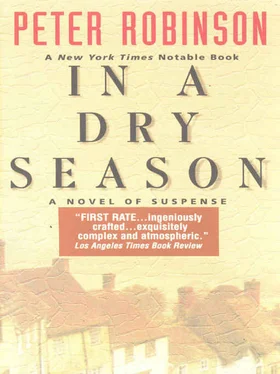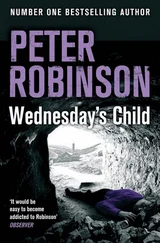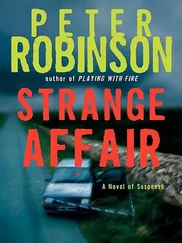He lit the last cigarette of the day and took his drink outside. The cottage stood on a narrow, unpaved laneway about fifty yards west of Gratly. Opposite Bank’s front door was a sort of bulge in the low wall that ran between the lane and Gratly Beck. In the daytime, it was an ideal spot for ramblers to stop for a moment and admire the falls, but at night there was never anyone there. The lane wasn’t a through road, and there was plenty of room for Banks to park his car there. Just beyond the cottage, it dwindled to a public footpath, which ran between the woods and the side of Gratly Beck.
Banks had come to see this area as his personal veranda, and he liked to stand out there or sit on the low wall dangling his legs over the edge late in the evening, when it was quiet. It helped him think, get things sorted.
Tonight, the stone was still warm; the smoke on his tongue tasted sweet as fresh-mown hay. A sheep bleated high on the daleside, where the silhouetted falls were only a shade or two blacker than the night itself. Sharp starlight pricked the satin sky, along with the lights of a distant farmhouse; a gibbous moon hung over Helmthorpe, in the valley bottom, and the square church tower, with its ancient weather vane, stood solid against the night. This must have been what the blackout was like, Banks thought, remembering his mother’s stories of getting around London during the Blitz.
As Banks sat by the dried-up waterfalls, he thought again about the odd way he had come to live in this isolated limestone cottage. It was a “dream cottage” in more than one way: though he had never told anyone this, he had actually bought it because of a dream.
Over his last few months alone in the Eastvale semi, Banks had drifted so far from himself that he hadn’t even cleaned or tidied the place since Christmas. Why bother? He spent most of his evenings out in pubs or driving the countryside alone, anyway, and his nights falling asleep half-drunk on the sofa, listening to Mozart or Bob Dylan, fish-and-chips wrappers and take-away cartons piling up in an ever-widening circle around him.
In April he seemed to reach his lowest ebb. Tracy, who had been to visit her mother in London that Easter weekend, let it slip over the telephone that there was a new man in Sandra’s life, a photo-journalist called Sean, and that they seemed serious. He looked young , Tracy said. Which was a hell of a compliment coming from a nineteen-year-old. Banks immediately began to wonder just how long this affair had been going on before he and Sandra separated last November. He asked Tracy, but she said she didn’t know. She also seemed upset that Banks would even suggest it, so he backed off.
As a result, Banks was more full of anger and self-pity than usual that night. Whenever he thought of Sean, which was far more often than he would have liked, he wanted to kill him. He even considered phoning an old mate on the Met and asking if they couldn’t put the bastard away for something. There were plenty of coppers on the Met who would jump at the chance to put someone called Sean away. But while he had certainly bent the rules occasionally, Banks had never yet abused his position for his own ends, and even at his lowest ebb he wasn’t going to start.
His hatred was unreasonable, he knew, but when was hatred ever reasonable? He had never even met Sean. Besides, if Sandra wanted to pick up some toy boy and take him home to her bed, it was hardly the toy boy’s fault, was it? More likely hers. But reason didn’t stop Banks from wanting to kill the bastard.
That night, after several whiskeys too many, he had fallen asleep on the sofa as usual, with Dylan’s Blood on the Tracks playing on the CD. Long after the music had finished, he woke from a dream peculiar only for its emotional intensity.
He was sitting alone at a pine table in a kitchen, and sunlight flooded through the open curtains, bathing everything in its warm and honeyed glow. The walls were off-white, with a strip of red tiles over the sink and counter area; matching red canisters for coffee, tea and sugar stood on the white Formica countertops, and copper-bottomed pots and pans hung from a wooden rack beside the set of kitchen knives. The clarity of detail was extraordinary; every grain and knothole in the wood, every nuance of light on steel or copper shone with a preternatural brightness. He could even smell the warm pine from the table and the fitted cupboards, the oil on the hinges.
That was it. Nothing happened. Just a dream of light. But the intense feeling of well-being it gave him, as warm and bright as the sunlight itself, still suffused him when he awoke, disappointed to find himself alone and hung over on the sofa in the Eastvale semi.
When Sandra decided a few weeks later that their separation was to be permanent – or at least that reconciliation wasn’t imminent – they sold the semi. Sandra got the television and VCR; Banks got the stereo and the lion’s share of the CD collection. That was fair; he had collected them in the first place. They split the kitchenware, and for some obscure reason, Sandra also took the tin opener. Books and clothes were easily divided, and they sold most of the furniture. All in all, there hadn’t been a hell of a lot to show for over twenty years of marriage. Even after the sale, Banks didn’t care much where or how he lived, until a few weeks in a bed-and-breakfast place straight out of Bill Bryson changed his mind.
He began to seek isolation. When he first saw the cottage from the outside, he didn’t think much of it. The view of the dale was terrific, as was the seclusion afforded by the woods, the beck, and the ash grove between the cottage and Gratly itself, but it was a squat, ugly little place that needed a lot of work.
A typical Dales mix of limestone, grit and flag, it had originally been a farm laborer’s cottage. Carved into the gritstone doorhead was the date “ 1768” and the initials “J.H.,” probably the time it was built and the initials of the first owner. Banks wondered who J.H. was and what had become of him. Mrs. Perkins, the present owner, had lost both her two sons and her husband, and she was finally leaving to move in with her sister in Tadcaster.
Inside, the place didn’t make much more of an impression at first, either; it smelled of camphor and mold, and all the furniture and decor seemed dark and dingy. Downstairs was a living room with a stone fireplace at one end; upstairs, only two small bedrooms. The bathroom and toilet had been tacked on to the kitchen at the back, as they often were in such old houses. Plumbing was pretty primitive back in 1768.
Banks was not a believer in visions and prescience, but he would have been a fool to deny that when he walked into the kitchen that day he experienced the same feeling of well-being and of peace that he had experienced in the dream. It looked different, of course, but he knew it was the same place, the one in his dream.
What it all meant, he had no idea, except that he had to have the cottage.
He didn’t think he would be able to afford it; properties in the Dales were fetching astronomical prices. But fortune and human eccentricity proved to be on his side for once. Mrs. Perkins had no love whatsoever for the holiday-cottage trade and no particular greed for mere money. She wanted to sell to someone who would actually live in the cottage. As soon as she found out that Banks was looking for just such a place, and that his name was the same as her maiden name, the deal was as good as done. The only black mark against Banks was that he wasn’t born a Yorkshireman, but she took to him anyway, convinced they were related, and she even flirted with him in that way some old ladies have.
When she let him have the place for £50,000, probably about half of what she could have got, telling him it would be enough to see her to her grave, Dimmoch, the estate agent, groaned and shook his head in disbelief. Afterward, Banks always had the impression that Dimmoch suspected him of exerting undue pressure on Mrs. Perkins.
Читать дальше












